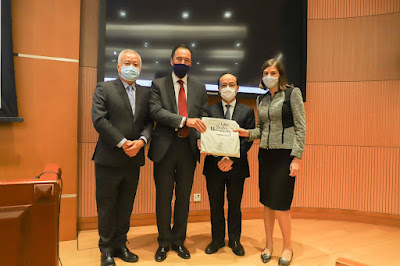 Anna Dziedzic joined HKU Law as a Global Academic Fellow in 2019. She researches in the field of comparative constitutional law, with a particular focus on constitutional change and the role of judges and judiciaries. She used the Global Academic Fellowship to undertake broader comparative research into foreign judges and the significance of nationality to judicial office. Her book, Foreign Judges in the Pacific, will be published by Hart Publishing in November 2021.
Anna Dziedzic joined HKU Law as a Global Academic Fellow in 2019. She researches in the field of comparative constitutional law, with a particular focus on constitutional change and the role of judges and judiciaries. She used the Global Academic Fellowship to undertake broader comparative research into foreign judges and the significance of nationality to judicial office. Her book, Foreign Judges in the Pacific, will be published by Hart Publishing in November 2021. 1. When were you a Global Academic Fellow with HKU Law?
I was a Global Academic Fellow in Hong Kong from August 2019 to August 2021. This time encompassed both the Hong Kong protests and the pandemic, but despite these challenges the Fellowship was a dynamic and rewarding experience.
2. What was the topic of your PhD thesis? Were you able to extend or develop your PhD research during your time as a Global Academic Fellow?
I completed my PhD thesis at Melbourne Law School in 2019, on the topic of foreign judges on courts of constitutional jurisdiction in Pacific island states. The Global Academic Fellowship at HKU Law provided me with the opportunity and the support to develop my research on foreign judges beyond the Pacific to consider the more than 50 jurisdictions which use foreign judges, in some way, on their domestic courts.
One reason I was attracted to post-doctoral research at HKU was that Hong Kong has its own experience of using foreign judges on its Court of Final Appeal, a point of similarity that connected with my research on Pacific island judiciaries. I was able to test some of the theoretical insights that emerged from my study of foreign judges in the Pacific by applying them to the different context of Hong Kong, especially as the position of foreign judges came under pressure after the enactment of the National Security Law in 2020.
In addition, with funding from the HKU Law Faculty and support from HKU’s Centre for Comparative and Public Law, I and Professor Simon Young led a comparative project on foreign judges on domestic courts. This included an international workshop in May 2021, during which 36 judges, scholars and practitioners came together to discuss the use of foreign judges in over 30 jurisdictions across the world, and a joint keynote presentation from Justice Joseph Fok PJ and Justice William Gummow NPJ of the Hong Kong Court of Final Appeal. The papers presented at the workshop will be published in The Cambridge Handbook of Foreign Judges on Domestic Courts, co-edited by Professor Young and I.
The Global Academic Fellowship also provided me with the time and space to revise and extend my PhD thesis for publication as a monograph titled Foreign Judges in the Pacific.
3. What other opportunities did you take up during your fellowship?
Living and working in Hong Kong also opened up new areas of comparative study for me. In response to issues raised by the protest movement of 2019, Julius Yam and I prepared a CCPL Policy Paper on the potential use of amnesties in contexts of civil unrest. This work inspired a scholarly paper comparing amnesties for street protesters across the world and examining the normative justifications for amnesties in the distinctive context of street protest.
While a Global Academic Fellow, I was invited to be Associate Director of the Centre for Comparative and Public Law. This role provided many opportunities to collaborate with comparative constitutional law academics and research centres around the world and to organise and participate in seminars and conferences, both in person and online.
4. How did you like living in Hong Kong and being part of the HKU Law community?
The HKU Law community is very welcoming and supportive. It is also a diverse community and in addition to connecting with scholars in my field of public law, I learned a lot from scholars of law and literature, legal theory, and empirical legal studies, to name a few.
One aspect of the community that I particularly enjoyed was convening the Junior Scholars Forum. Together with Chris Szabla (another Global Academic Fellow) we sought to create a space for post-doctoral and post-graduate researchers from the three law schools in Hong Kong to meet and share their work in a supportive and collegial way. It was a valuable way to build connections with researchers from other Hong Kong universities working in very different areas of law.
5. How did the Global Academic Fellowship prepare you for the next stage of your academic career?
The Global Academic Fellowship is a great stepping stone to further research as well as a tenured academic career. I was able to extend my research agenda, strengthen my publication record, and develop networks of scholars and practitioners in Hong Kong and beyond. There were also opportunities to teach, participate in events, and engage with student associations and the wider legal community, all experiences that open many doors for future work.
6. What advice would you have for someone thinking of applying for the fellowship?
Do it! The Global Academic Fellowship is a rare post-doc: two years with the freedom to choose what you are going to research and write about. With time, funding and a supportive Faculty, you can continue to follow research pathways from your PhD thesis or begin something completely new.

No comments:
Post a Comment